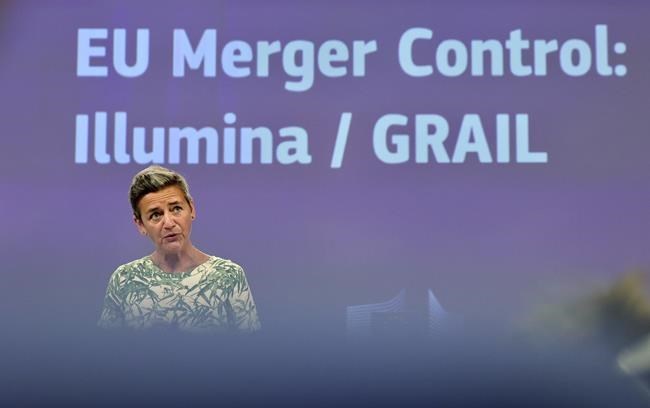BRUSSELS (AP) — The European Union on Wednesday slapped a $475 million fine on U.S. biotech giant Illumina for buying out cancer-screening company Grail without the approval of the 27-nation bloc's antitrust watchdog, the latest setback for the deal.
Illumina announced an $7.1 billion acquisition of Grail in 2020, but the European Commission, the EU's executive arm, said the company broke the bloc's merger rules by completing the deal without its consent. The EU had announced last year that it was blocking the merger, saying it would hurt competitors.
“If companies merge before our clearance, they breach our rules. Illumina and Grail knowingly and deliberately did so by implementing their tie-up as we were still investigating,” said EU antitrust Commissioner Margrethe Vestager. “This is a very serious infringement.”
Regulators worldwide have taken aim at the deal. The Federal Trade Commission ordered Illumina to reverse the buyout after finding it would “stifle competition and innovation in the U.S. market for life-saving cancer tests.” Similiarly, the EU said the acquisition would squeeze out competitors and give Illumina too dominant of a position in the market.
San Diego-based Illumina is a major supplier of next-generation sequencing systems for genetic and genomic analysis, while Grail is a health company developing blood tests to try to catch cancer early.
Illumina vowed to appeal the European fine — like it did the FTC order — and is waiting for the EU's highest court to rule on its challenge to the commission's ability to review the merger.
“We believe that the fine announced by the European Commission today — while expected and accrued for over the last year — is unlawful, inappropriate and disproportionate,” the company said in a statement.
The commission says companies almost invariably play by the rules and wait to complete an acquisition or merger until antitrust authorities have cleared it.
The turmoil over the acquisition has led to upheaval at Illumina. Its CEO and director, Francis deSouza, resigned last month after the company's chairman was voted out by shareholders in May. It followed a monthslong heated battle with activist investor Carl Icahn over the difficulties of the Grail acquistion, with Icahn urging shareholders to oust both executives.
Court arguments in Illumina's appeal of the FTC order to sell Grail are set to begin in September. It comes after a judge handed U.S. regulators a defeat this week in its bid to block Microsoft's blockbuster purchase of video game maker Activision Blizzard.
In Europe, regulators imposed the maximum possible fine of 432 million euros, the commission said in a statement. Such fines can reach up to 10% of a company's annual revenue depending on the severity of the infraction.
“Illumina and Grail knowingly and intentionally breached the standstill obligation during the commission’s in-depth investigation," the statement said. "This is an unprecedented and very serious infringement undermining the effective functioning of the EU merger control system.”
It insisted that “Illumina strategically weighed up the risk of a gun-jumping fine against the risk of having to pay a high break-up fee if it failed to take over Grail. It also considered the potential profits it could obtain by jumping the gun.”
Raf Casert, The Associated Press



